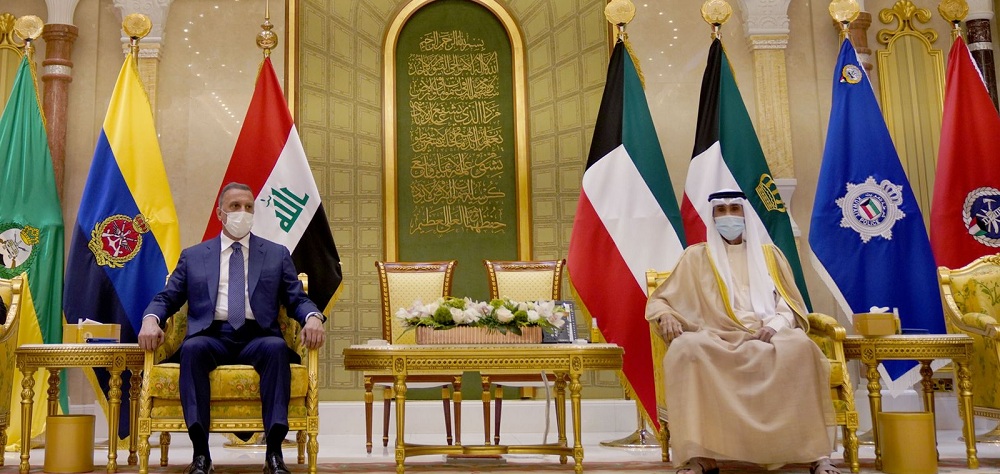Alwaght- Embarking on a new foreign policy approach, Iraq seems to plan an exit from the state of passivity in regional equations. Over the past years, Baghdad has taken path of active diplomacy in the region en route to expansion of relations with all important actors like Iran, Saudi Arabia, Turkey, and the UAE. In late August, Iraq will host an inclusive regional conference.
The visit to Kuwait of the Iraqi Prime Minister Mostafa al-Kadhimi on Saturday was an example of the Iraqi leader's follow-up of this approach, as the visit was first to an Iraqi PM since 2003, namely the fall of Saddam Hussein rule. Kuwait and Iraq underwent considerable level of tensions and disputes especially after 1991, the year dictator Saddam invaded the neighboring Kuwait. However, after Saddam regime fall, the two countries resumed their ties. But what goals are taking al-Kadhimi to Kuwait?
Settling disputes, patching up relations
The most preliminary and accessible goal of the Iraqi PM is solving the disputes and improving the relations. Prior to his trip, the PM had said that "brotherly and honest talks" were the shortest way to deeper cooperation and better future. As a first step towards these goals, the two countries discuss entry of the Kuwaiti investors to Iraq's market, Kuwait's active role playing in sustainable development, investment in industry and trade, and boost of bilateral trade under the shadow of "real will" to enhance cooperation at all levels.
At another level, one of the various issues between Iraq and Kuwait is the unresolved disputes. Despite the fall of the Ba'athist regime, the issue of paying off compensations for Iraq's invasion of Kuwait in 1991 remains a major challenge between the two countries. Here are some of the unsettled disputes: Joint oilfields, the case of the missing Kuwaitis of the 1990s invasion, and the Khor Abdullah agreement signed between them in 2012."
Al-Kazemi is now trying to minimize some of these differences between the two sides during his trip. In the meantime, his special focus could be on the issue of war damage payments and the postponement of the $ 1.6 billion loan that Kuwait has paid to Iraq. According to the latest reports, Iraq paid its latest $440 million loan installment to Kuwait last April and still owes Kuwait $2.8 billion in war damages.
Regional balance making
Beside bilateral relations, the visit to Iraq has another driver, which is regional political developments and equations. In recent months, Iraq especially pursued a policy of closeness to the Arab world. Additionally, it is noteworthy that Kuwait visit comes as in late August Baghdad regional conference will be held and regional countries like Iran, Saudi Arabia, Turkey, Kuwait, and Jordan are invited. Paying the visit in a short time from the Baghdad meeting signals intensified effort from the Iraqi diplomacy apparatus to reach a positive regional equation and closeness to the Arab countries.
At the same time, it is important to note that the PM al-Kadhimi is eyeing a positive balance with other Arab states. In recent years, Saudi Arabia and the UAE created tremendous security and political challenges Iraq. Their backing to ISIS terrorist group and other takfiri organizations inside Iraq pushed Baghdad leaders, starting with al-Kadhimi predecessor Adel Abdul Mahdi, to consider a positive balance making policy with the Arab world, a measure aimed at stopping anti-Iraqi Arab policies.
In line with this policy, al-Kazemi visited Saudi Arabia and the UAE as his first foreign travel destinations. Even al-Kadhimi is optimistic about the support of the Arab League, or in particular wealthy Arab countries such as the UAE and Saudi Arabia, for the reconstruction of Iraq in the post-ISIS period. On the one hand, he seeks to raise funds for the rebuilding, and on the other hand, to increase the trade volume and economic relations with the Arab states.
The PM also eyes restoring the Iraqi regional position through mediation between other actors. Mediating between Iran and Saudi Arabia is a major focus point, with Baghdad so far hosting negotiations between Tehran and Riyadh for three rounds. These efforts help create a positive balance also between Iran and the Arab states.
Al-Kadhimi seeking stay in power
Beside the above-mentioned goals, al-Kadhimi follows a foreign policy path that can enable him to retain his post after October 10 general elections. In addition to home, in recent months al-Kadhimi has specially counted on foreign and regional patronage to hold the post.
Therefore, his trip to Kuwait reflects his attention to the foreign backing for boosted internal position. If he succeeds to attract financial aids from Kuwait, he can solidify his power among the political factions more than ever. Entry of Kuwait's investors to Iraq and persuading them to bolster investment in the Iraqi trade and industry sectors can uniquely help his prestige and place perk up. For al-Kadhimi, Kuwait can help connect Iraq to the Persian Gulf Arab states' power grid network.



























